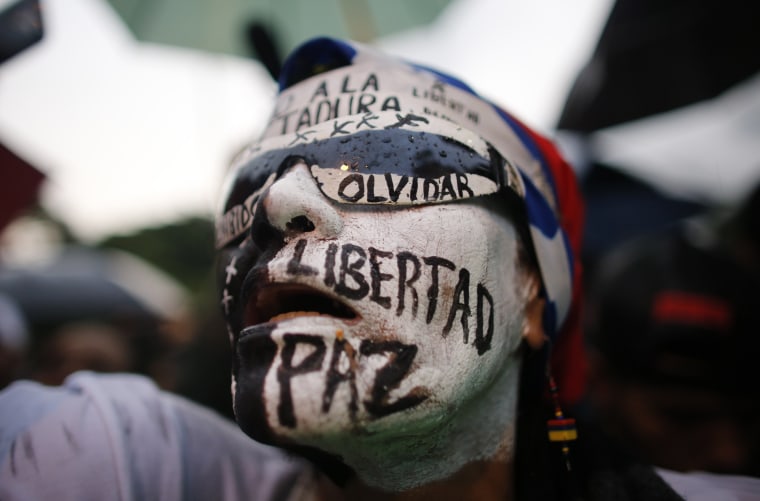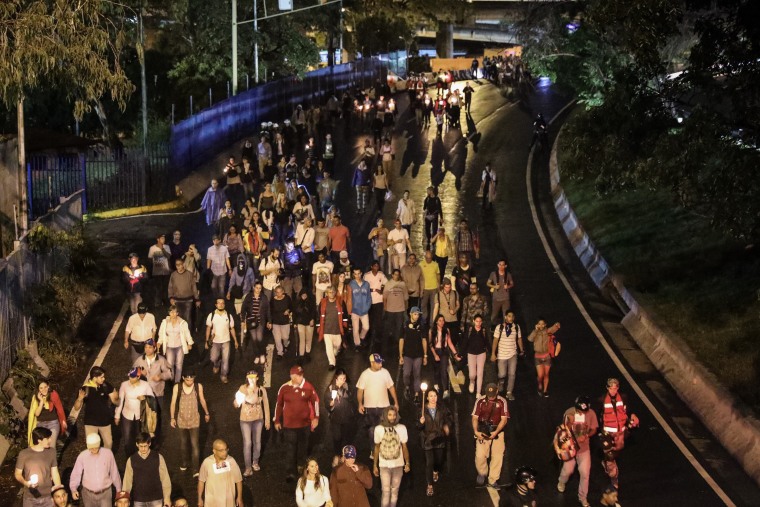MIAMI, Florida — After more than 100 days of protests, the violence and unrest in Venezuela continues, sparking increasing reactions from the international community. Amid the deteriorating situation, opposition leaders from the National Assembly have called for a symbolic plebiscite, or referendum vote, on Sunday and are urging Venezuelan nationals around the globe to either support or reject President Nicolas Maduro’s plan to rewrite the constitution.
The July 16 plebiscite comes two weeks before the government holds a vote on July 30 to elect delegates to a special assembly. That special assembly would then begin a rewrite of the constitution. Maduro has said this overhaul is the best solution to finding peace in Venezuela.
Even with the threat of low turnout for the July 30th vote hanging over the process, the government is determined to go ahead, as the Associated Press reported. "Even if only one, two or three Venezuelans vote, it's still an election and the opposition will be left there squealing," socialist party leader Diosdado Cabello said on state TV.
The plan for Sunday's plebiscite was announced by the President of the National Assembly, Julio Borges in a response to Maduro’s plan, arguing a referendum is required just to call for a constitutional assembly. Former President Hugo Chavez called a referendum both times he attempted to rewrite the constitution.
According to the AS/COA in 1999, 88 percent of Venezuelans supported Chavez’s call for a constituent assembly. However, based on a poll from the Caracas polling firm Datanalisis, 85 percent of those surveyed this year said a rewrite of the constitution was “unnecessary.”
Eighty-six percent of those polled this year also said President Maduro should have held a national vote first to ask Venezuelans if they wanted a constituent assembly.

The opposition is providing a website so that Venezuelans around the globe can check their voting locations and see a ballot before making their way to polling locations, which include cities around the U.S. as well as in Puerto Rico.
Ahead of Sunday's vote, a group of academics, human rights experts and journalists spoke out about the country’s situation in Miami, where there is a substantial community of Venezuelan Americans.
At the “Voices from Venezuela: Understanding the Crisis” forum on Thursday sponsored by The Americas Society/Council of the Americas, experts said that Sunday’s vote could be a turning point for Venezuela.
Like thousands of Venezuelans, Juan Manuel Raffalli, a constitutional law professor in Venezuela, disagrees with President Maduro about changing the constitution as a solution to the country’s instability. He described how Venezuela was once a solid democracy, but now the government has no interest in finding a solution to the situation.
“The government is facing its own people,” said Raffalli. “The control of public demonstrations in the street has been criminal. And yet the people continue to fight because they are fighting for their future.”
Jose Domingo Mujica, national coordinator for the Election Observation Network of the civil association “Asamblea de Educación,” said “we’ve been battling increasing restrictions in the opportunities we have to vote.” He said that official state media does not give equal access to opposition candidates, and has changed the rules if the opposition candidates are getting more votes so as to favor the government’s candidates.

All of the panelists called for the international community’s support. Beatrice Rangel, of the Miami-based Amla Consulting Group and former chief of staff to Venezuelan president Carlos Andrés Pérez, urged the OAS to declare Venezuela completely outside of the democratic charter and asked the Security Council to see the situation firsthand.
She concluded that only after Sunday’s vote will the international community feel strongly enough to react.
Rangel said that what occurred at the National Assembly last week with regards to armed pro-government militia attacking congressman is just a “little sample of what they [the government] are about to do,” speaking of Sunday’s plebiscite.
Marianela Balbi, executive director of Venezuela's Press and Society Institute, said journalists are facing dangers every day while reporting in Venezuela.
But she also spoke to the innovative ways that journalists have bypassed media censorship in Venezuela. According to Balbi, of the 30 state media channels, none have reported on the deaths of dozens of protesters.
“We need to hold up a mirror to what's happening in Venezuela, because the government's trying to hide it,” said Balbi.
The AS/COA forum can be viewed here: http://www.as-coa.org/events/voices-venezuela-understanding-crisis#video